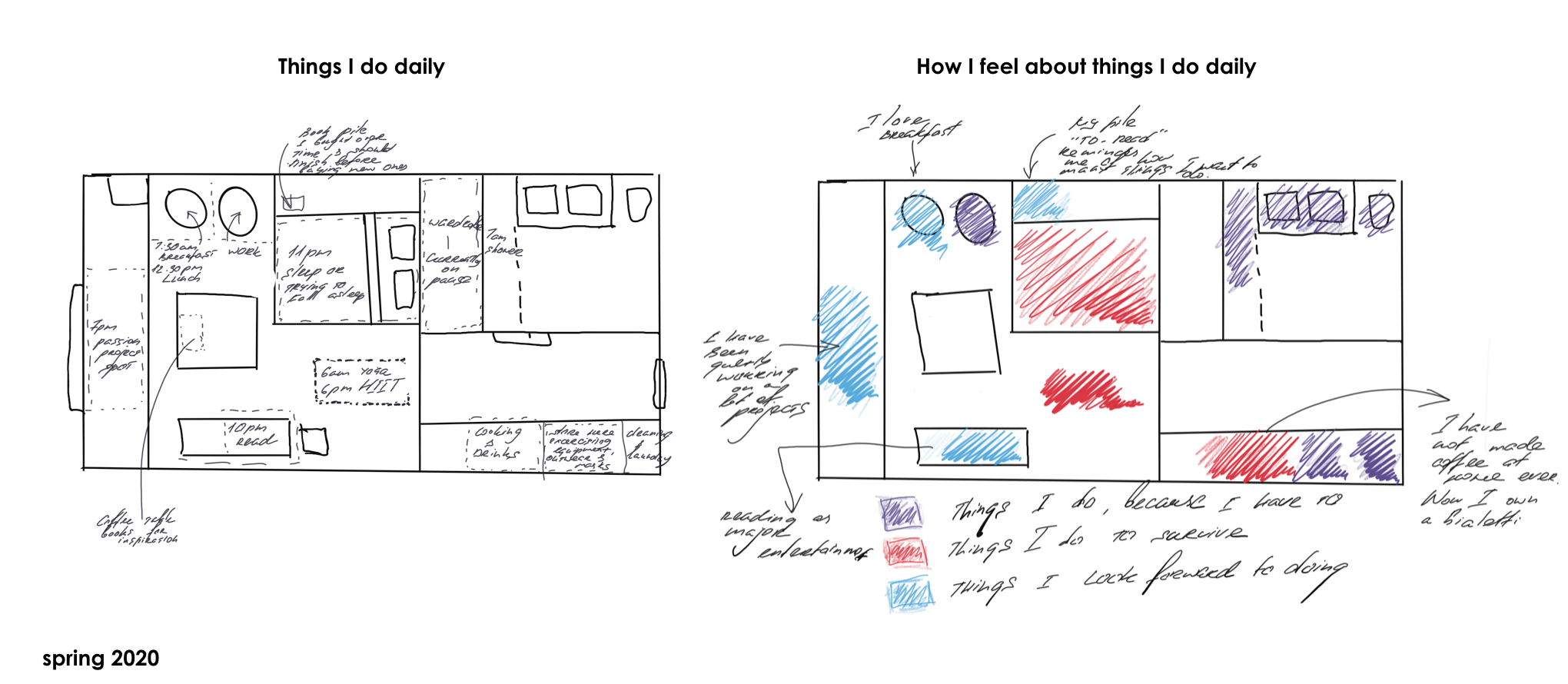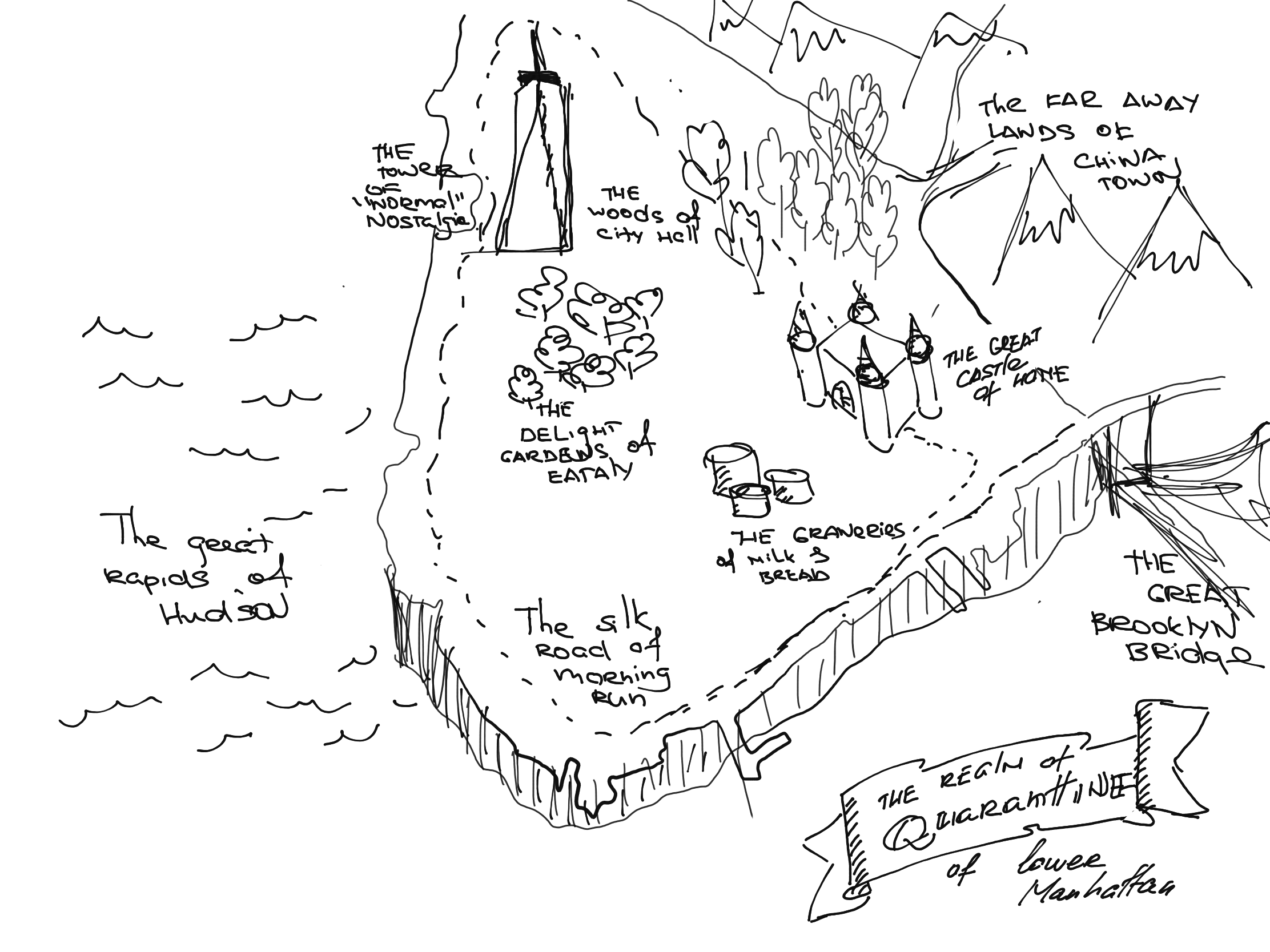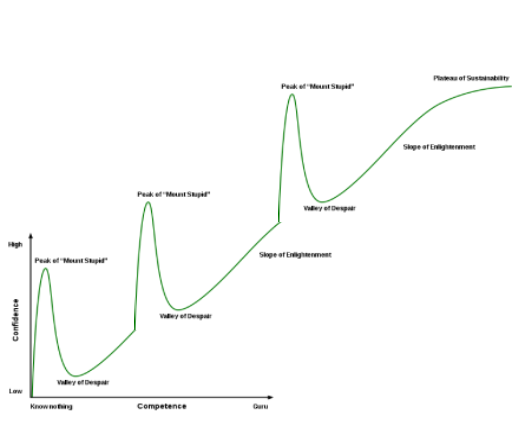I drew my home-made map of current surroundings. The first one shows my spatial schedule inside my apartment. The second is the same apartment, but color-coded by sentiment. Many many more people draw their worlds during COVID-19 pandemic for CityLab project. All maps show a diversity of experiences. Some are very relatable, some very personal and revealing, but all highly creative. Here are some of my that caught my attention:
My favorite is the “magic kingdom of Quarantine” by Stentor Danielson: “And since some of my friends were confused, the Red and Black God is Netflix.” :) (I also have immediately looked him up, found out that he sells his map drawings on Etsy: Mapsburgh by Mapsburgh on Etsy and instantaneously ordered a couple to send as gifts). Great artists steal, so I replicated his style for my surroundings. Here is my Realm of Quarantine of lower Manhattan.
As I run through the “Silk Road” around Hudson river, surrounded by tall and empty skyscrapers of Lower Manhattan, I feel like I live in the fairytale, just written not by Green, but Gehry.
Speaking of fantasy maps - I have been following game development of the game by Robin Sloan Perils of the Overworld and I am absolutely obsessed with reading about his progress. Following his newsletter, I have discovered multiplicity of very important information:
* Stock phrases for story-starting across the world. My favorite is probably Czech: “Beyond seven mountain ranges, beyond seven rivers . . .”
* Fantasy Map Generator - bookmarking to use in the future
* And more here: Generating fantasy maps
* New books recommendation about writing: “Writing Tools” by Roy Peter Clark
* Oblique Drawing: The Atlas of Oblique Maps, published in 1988, available in its entirety online. (Be careful with that link: it points to a 250 megabyte PDF!)
Favorite quote of Robin Sloan: “I don’t know how anybody writes without a Dictionary of Fairies close at hand…!”
After reading about Robin’s work, I am itching to build something with Ink - scripting language for text game development, but I have to pace myself with other projects that I am currently working on.
If you feel that the writing style of this week is different - you are right. I have used the Hemingway Editor shared by my friend Jay. The editor promises to make my writing bold and clear. I am not sure if “bold and clear” is my style. Maybe convoluted and fluffy is my style. But the editor is putting a readability grade to the text and so far I am yet to achieve readability of 5th grade.
** This paragraph ranks for Grade 4
Somewhere during this week trying to improve on web-component construction I have stumbled on Peak of Mt. Stupid and the valley of despair that captures the way I feel every time I learn something new.
/The Dunning–Kruger effect is a cognitive bias in which unskilled people make poor decisions and reach erroneous conclusions, but their incompetence denies them the metacognitive ability to recognize their mistakes. The unskilled therefore suffer from illusory superiority, rating their ability as above average, much higher than it actually is, while the highly skilled underrate their own abilities, suffering from illusory inferiority./ > /You don’t even know enough to realize just how little you know./
But then I saw an extended diagram of the original that someone has shared on Twitter and I think it is a better proxy of real life. It definitely captures better my week.
/“One of the painful things about our time is that those who feel certainty are stupid, and those with any imagination and understanding are filled with doubt and indecision.” - Bertrand Russell/
Further reading on Dunning Kruger effect:
* [Why People Fail to Recognize Their Own Incompetence] 2003
* [Not Knowing Thyself] 2006
Some beautiful inspiration : [The Technium: 68 Bits of Unsolicited Advice]
* Trust me: There is no “them”.
* Hatred is a curse that does not affect the hated. It only poisons the hater. Release a grudge as if it was a poison.
* Being enthusiastic is worth 25 IQ points.
* Always demand a deadline. A deadline weeds out the extraneous and the ordinary. It prevents you from trying to make it perfect, so you have to make it different. Different is better.
* Treating a person to a meal never fails, and is so easy to do. It’s powerful with old friends and a great way to make new friends. *
* Don’t be the smartest person in the room. Hangout with, and learn from, people smarter than yourself. Even better, find smart people who will disagree with you.
* Don’t be the best. Be the only.
* Everyone is shy. Other people are waiting for you to introduce yourself to them, they are waiting for you to send them an email, they are waiting for you to ask them on a date. Go ahead.
* Don’t take it personally when someone turns you down. Assume they are like you: busy, occupied, distracted. Try again later. It’s amazing how often a second try works.
* The purpose of a habit is to remove that action from self-negotiation. You no longer expend energy deciding whether to do it. You just do it. Good habits can range from telling the truth, to flossing.
* To make something good, just do it. To make something great, just re-do it, re-do it, re-do it. The secret to making fine things is in remaking them.
* Show up. Keep showing up. Somebody successful said: 99% of success is just showing up.
* Perhaps the most counter-intuitive truth of the universe is that the more you give to others, the more you’ll get. Understanding this is the beginning of wisdom.
* You are what you do. Not what you say, not what you believe, not how you vote, but what you spend your time on.
* Be prepared: When you are 90% done any large project (a house, a film, an event, an app) the rest of the myriad details will take a second 90% to complete.
* When you die you take absolutely nothing with you except your reputation.
* Before you are old, attend as many funerals as you can bear, and listen. Nobody talks about the departed’s achievements. The only thing people will remember is what kind of person you were while you were achieving.
* Anything real begins with the fiction of what could be. Imagination is therefore the most potent force in the universe, and a skill you can get better at. It’s the one skill in life that benefits from ignoring what everyone else knows.
* A vacation + a disaster = an adventure.
* Buying tools: Start by buying the absolute cheapest tools you can find. Upgrade the ones you use a lot. If you wind up using some tool for a job, buy the very best you can afford.
* Over the long term, the future is decided by optimists. To be an optimist you don’t have to ignore all the many problems we create; you just have to imagine improving our capacity to solve problems.





